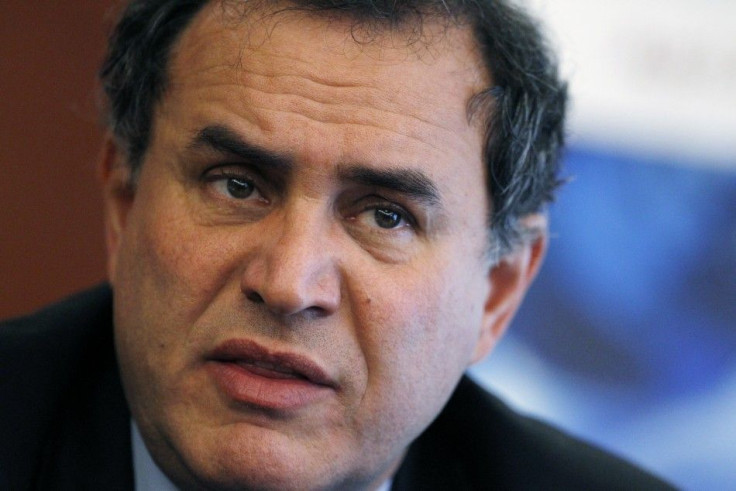NYU?s Nouriel ?Dr. Doom? Roubini: Better Than 50% Chance of U.S. Recession
Analysis

A better than 50 percent that the U.S. economy could fall back in to a recession within the next year? And this, after the nation's worst and longest recession in more than 70 years, the Great Recession of 2007-2009?
On the heels of the U.S. Congress passing the U.S. debt deal act, you weren't expecting an "all-clear, the sky is a solid, azure blue" message, were you?
Economist Nouriel "Dr. Doom" Roubini, the New York University professor who four years ago accurately predicted the global financial crisis, said there is a better than 50 percent chance the U.S. economy will fall back into a recession in the next 12 months.
Didn't Like July Jobs Report
In an interview with Bloomberg Television, Roubini termed the July U.S. jobs report, which indicated the U.S economy created a better-than-expected 117,000 jobs, "a pretty lousy report."
The report also indicated that the U.S. unemployment rate dipped to 9.1 percent from 9.2 percent, but it came with a qualifier.
"The main reason the unemployment rate went down is that so many people left the labor force," Roubini said, and hence they weren't technically counted as being unemployed.
Further, Roubini said the U.S. economy is nowhere near a self-sustaining economic expansion.
"There's a more than 50 percent chance of a recession in the next 12 months." Roubini said, adding that he sees U.S. GDP growth at just two percent for all of 2011, and a 1.5 percent growth rate for the second half of the year.
"The growth rate is so slow, that it's going to feel like a recession," Roubini said
The U.S. Federal Reserve, European Central Bank, Bank of England, and the Bank of Japan, in conjunction with other central bankers, and policy makers in the world's major economies have committed more than $4 trillion in monetary stabilization and fiscal stimulus to cope with the financial crisis and rev-up GDP growth after the worst global recession since the Great Depression.
Policy Makers Must Make Difficult Choices
Further, policy makers in the 12 months ahead will likely have to face one of two difficult choices.
If they remove monetary stabilization and stimulus funds too soon, central bank and government officials may undermine the recovery and tip their economies in to a recession, possibly accompanied by deflation.
On the other hand, if central banks maintain large and in some cases, unprecedented budget deficits, these nations could be punished by bond market vigilantes and inflation hawks, with rising inflation expectations pushing long-term government bond interest rates significantly higher.
This week, those bond investors -- the bond vigilantes -- hit Italy and Spain, forcing up the interest rates they have to pay to borrow money. European Union officials are now scrambling to formulate the correct policy response to at least stabilize interest rates and check the contagion.
Economic Analysis: The view from here is investors ignore Roubini's economic analysis and forecast only at their own peril. It's clear now that Europe has to provide more liquidity and/or merge more banks to get ahead of the contagion issue, and they may have to de-couple both Italy and Spain from the bond market, as they did with Greece and Ireland.
What's more, the above means the 2011 European GDP growth will be low at best, perhaps under 1.5 percent -- something that will weigh on U.S. GDP growth.
Roubini's analysis also points to the need for central bankers to withdraw stimulus slowly: in the case of the United States, only after its economic recovery has gained traction. The U.S. is nowhere near that, despite the not-horrible July jobs report.
Also, emerging market nations must continue to create engines of growth in their economies via increasing domestic demand: they can't count on strong U.S. GDP growth with high consumption to drive growth in this recovery.
© Copyright IBTimes 2024. All rights reserved.











